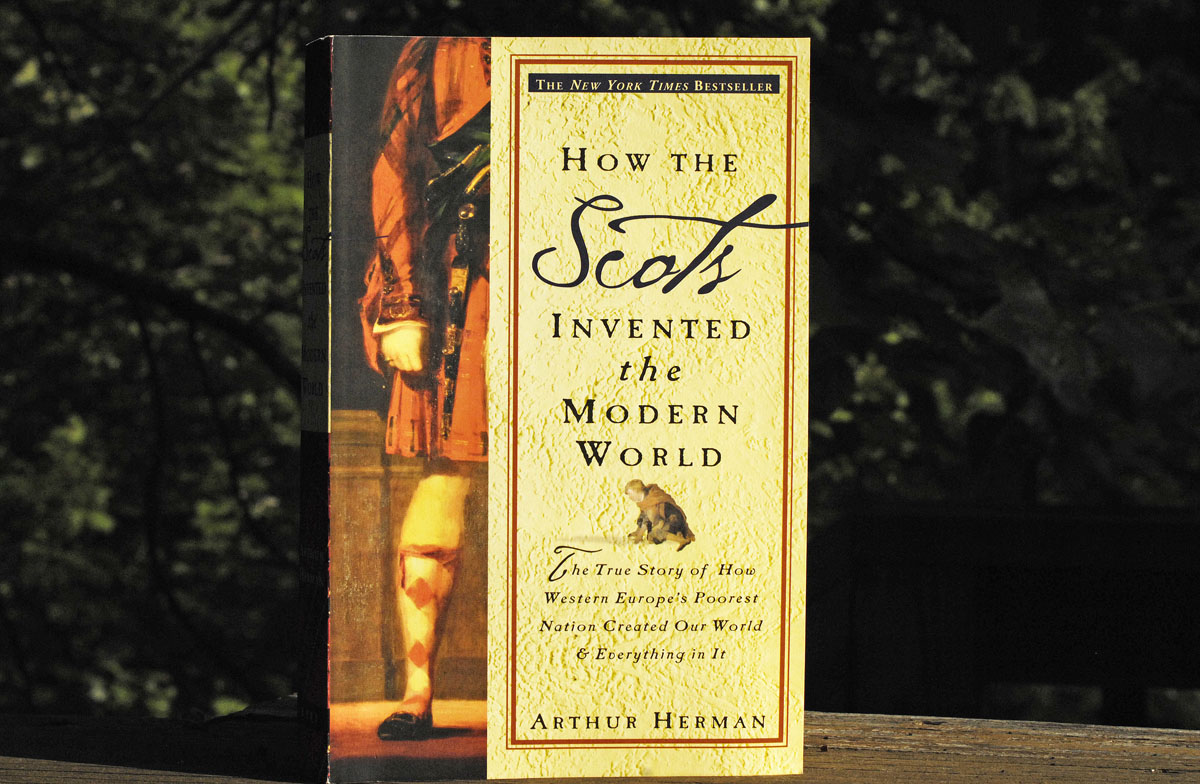How the Scots Invented the Modern World: The true story of how Western Europe’s poorest nation created our world and everything in it. By Arthur Herman. Random House, 2001. 472 pages.
The title and subtitle of this book contain quite a lot of hyperbole. Of course the Scots didn’t create the modern world and everything in it. But the Scots did have a great deal to do with lifting Western Civilization out of the darkness of Calvinism and into the Enlightenment. This is an excellent book that aims to tell that story.
The book covers two centuries. The story is complicated, too complicated to try to summarize here. The cast of characters is large, but I will name some of them: John Knox, Francis Hutcheson, Henry Home (Lord Kames), James Boswell, David Hume, Adam Smith, John Stuart Mill, Lord Byron, Sir Walter Scott, James Watt, John Loudon McAdam, David Livingstone, and many more.
Why was it that Scotland punched so far above its weight during such an important period in history? If you had to choose one word for it, then that word would be education. The Scottish emphasis on education probably has its roots in Scottish Calvinism and the view that everyone ought to be able to read the Bible for themselves. Early on, Scotland invested not only in public education, but also in its universities. It would be impossible to talk about the Enlightenment without talking a great deal about the University of Edinburgh. During the Enlightenment, a hunger for learning somehow became a part of the national character. Even for people of humble origins, paths based on merit existed for attaining higher education. The Scottish universities also tilted toward pragmatism much more than the classicism (and classism) of England’s universities. That set the stage for Scottish advances in science and engineering.
For those like me with a particular interest in Britain and Ireland, there is a lot of good stuff in this book — the tension between Edinburgh and Glasgow, the tension between Scotland and England, affinities and tensions between Scotland and Ireland, some history of Highland culture, and cultural factors relating to language and dialect.
This history actually brings us as far forward as 1981, when Scotland’s economy had fallen apart. Between 1979 and 1981, Herman writes, Scotland lost 11 percent of its industrial output and 20 percent of its jobs. That was the Scotland I encountered on my first trip to the British Isles in 1983. Edinburgh was lovely (and affordable). But upon getting off the train in Glasgow, I felt so overwhelmed by decay and dreariness that I got back on the train and returned to England. That was 35 years ago. In a few weeks, I will be passing through Glasgow on the train, going from Edinburgh to Oban. Glasgow, I believe, has changed a great deal since 1983.
Tourism is a big part of many economies. The World Travel & Tourism Council says that travel and tourism contribute about $2.3 trillion to the global economy each year and accounts for 109 million jobs worldwide. Those parts of the world that strive to remain old, so that the rest of us can go there and thus better imagine the past, are doing us a huge favor. Scotland’s Highlands are particularly suited for that. There is no shame in trying to preserve as much of the world as possible as a museum. Sir Walter Scott’s novels, actually, were a much earlier effort to preserve and romanticize Scotland’s Highland history. After a few days in Edinburgh, most of my trip to Scotland will be spent on the isle of Mull. With luck, I might be able to hear Scottish Gaelic spoken for the first time. As always, I will pay particular attention to language, food, and culture. And of course I’ll have lots of photos when I get back home in mid-September.


Sounds like a wonderful trip. Hope you enjoy all the sights and get to hear Scottish Gaelic. You may not venture away from Acorn Abbey (aka Paradise) often, but this trip should be worth leaving for a while.
I lived on the coast of South Carolina several years ago and miss the accents around Charleston. Their former long-time mayor, Joe Riley, had a great accent. The “Gitchie” language, native to the barrier islands off the coast,is a real joy to hear. Sadly, it seems to be disappearing.
Correction to prior post: language on barrier islands is “Geechee” or “Gullah”
David! My oldest daughter married a Brit and is living on the east coast of Scotland in a tiny fishing village called Crail. Magical place. Hope you have a great time.
Hi Amy… That’s awesome… I bet you visit often… 🙂
Hopefully you’ll still get to enjoy the current heatwave. It’s so hot this evening I’m yearning for rain 🙂
Hi Chenda… What area of England are you in, if I may ask?
Hi David
West Sussex, out in the South Downs 🙂